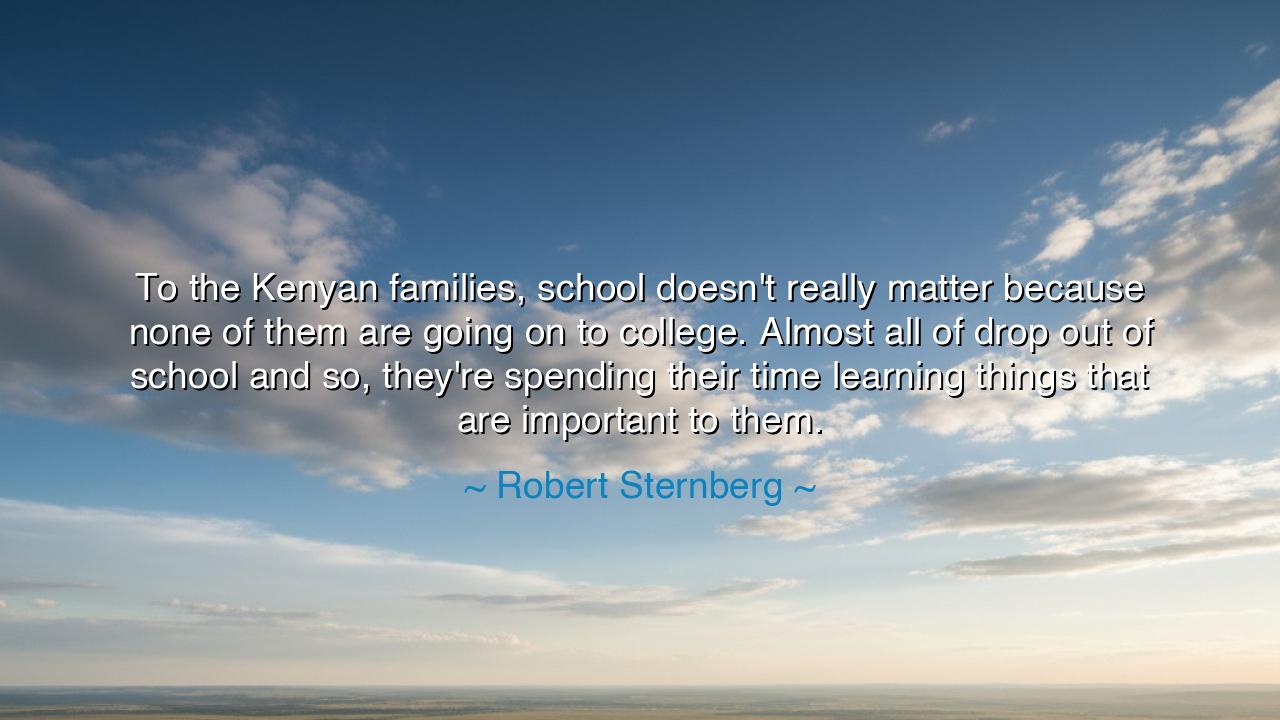
To the Kenyan families, school doesn't really matter because none
To the Kenyan families, school doesn't really matter because none of them are going on to college. Almost all of drop out of school and so, they're spending their time learning things that are important to them.






Hear this thorny saying held up to the sun: “To the Kenyan families, school doesn’t really matter because none of them are going on to college. Almost all drop out of school and so, they’re spending their time learning things that are important to them.” In these words, Robert Sternberg presses a hard question into our hands: who decides what counts as learning? Which knowledge is crowned, and which is dismissed as common, local, ordinary? The sentence stings because it seems to flatten a people; yet, read through the lens of his research, it aims to unflatten our notion of intelligence—to remind us that value is braided to context, and that education which does not serve a life will soon be shed like a snake’s old skin.
The origin of this thought lies in the study of practical intelligence—wisdom that thrives outside exam halls. In some rural Kenyan communities, children who learned to identify medicinal herbs, tend goats, negotiate markets, and care for younger siblings were praised not for grades but for competence. Researchers found that mastery of local health knowledge could flourish even as school performance lagged, and that the important skills for survival did not always rhyme with textbooks. The point was not to romanticize poverty nor to scorn classrooms, but to say: where the road does not lead to college, the village makes its own curriculum.
Consider a story from the red-dirt afternoon. A girl—let us call her Amina—can read the sky like a ledger. She knows by the tilt of the wind when the rains will come, and by the smell of the dust which path the cattle should take. She can bargain fairly, splice a fence, splint a lamb’s leg with reed and cloth, and brew an infusion that eases her brother’s fever. When inspectors arrive with clipboards, she stumbles on long division; when a storm tears the thatch, she is foreman, nurse, and quartermaster before noon. Tell me: is she uneducated, or is she educated in the currency her people spend each day?
Yet we must draw the blade carefully. To say school “doesn’t really matter” can wound when hurled without context. Many Kenyan families sacrifice dearly for classrooms; many children walk miles for lessons and dream of college. The quote cannot stand as a blanket over a nation diverse in language, livelihood, and aspiration. Its truer reading is narrower and more humane: where systems are brittle, fees heavy, and returns on formal credentials uncertain, families often invest in learning that keeps them fed, healthy, and whole. This is not a defect of character; it is an arithmetic of survival.
From this tension rises the larger lesson: real education is that which enlarges agency. If school is a ladder that touches no wall, people will build their own scaffolds. If curricula ignore the important knowledge of place—water, soil, stock, trade, health—the classroom becomes a foreign country. But when formal lessons braid with local mastery—when biology names the herbs children already use, when mathematics tallies harvests and savings, when language arts preserve story and proverb—then learning no longer forces a choice between the exam and the evening chores. The village and the school stand on the same side.
Let us, then, craft bridges instead of borders. Teach transfer: how to carry fieldcraft into science, market sense into accounting, storytelling into public speaking and civic life. Bring apprenticeship into the timetable; invite elders as co-teachers; let projects earn both marks and money. Offer flexible pathways so that a child like Amina can sit for national exams without abandoning the herd, and can step toward college if she chooses—carrying her competence with her rather than trading it away. In such schools, drop out of school becomes “drop into life,” not as resignation but as readiness.
Carry these practical actions as a charter. (1) Contextualize curricula—embed local agriculture, health, water, and enterprise in lessons so learning honors what is already important. (2) Value dual credentials—certify both academic achievement and community competencies (herbal knowledge, animal husbandry, first aid, trades). (3) Reduce friction—scholarships, meal programs, and flexible schedules that let children both study and contribute at home. (4) Teach upward mobility without erasure—mentorships linking village skills to formal careers (agribusiness, nursing, engineering, conservation). (5) Listen first—design with Kenyan families and teachers, not for them, so that “what matters” is spoken by those who live it. Do these faithfully, and the sting of the quote becomes medicine: a reminder that school must serve life, and that the richest learning is the kind that lets a child walk sure-footed in both the world they inherit and the world they may yet build.






AAdministratorAdministrator
Welcome, honored guests. Please leave a comment, we will respond soon